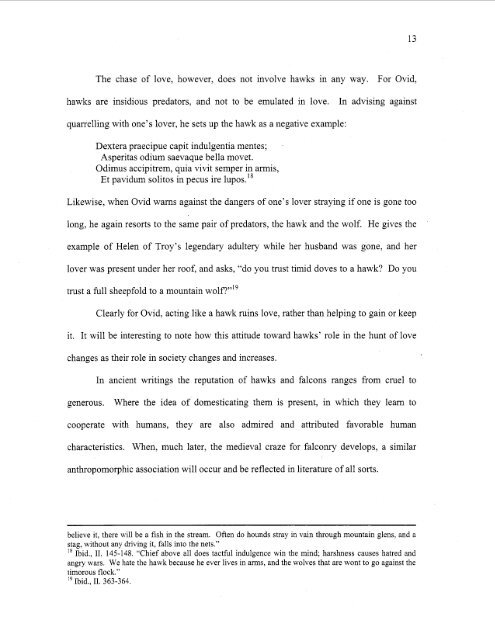Dissertation on Birds of Prey and the Sport - the Falconry Heritage ...
Dissertation on Birds of Prey and the Sport - the Falconry Heritage ...
Dissertation on Birds of Prey and the Sport - the Falconry Heritage ...
Create successful ePaper yourself
Turn your PDF publications into a flip-book with our unique Google optimized e-Paper software.
The chase <strong>of</strong> love, however, does not involve hawks in any way. For Ovid,<br />
hawks are insidious predators, <strong>and</strong> not to be emulated in love. In advising against<br />
quarrelling with <strong>on</strong>e's lover, he sets up <strong>the</strong> hawk as a negative example:<br />
Dextera praecipue capit indulgentia mentes;<br />
Asperitas odium saevaque bella movet.<br />
Odimus accipitrem, quia vivit semper in armis,<br />
Et pavidum solitos in pecus ire 1 ~~0s.'~<br />
Likewise, when Ovid warns against <strong>the</strong> dangers <strong>of</strong> <strong>on</strong>e's lover straying if <strong>on</strong>e is g<strong>on</strong>e too<br />
l<strong>on</strong>g, he again resorts to <strong>the</strong> same pair <strong>of</strong> predators, <strong>the</strong> hawk <strong>and</strong> <strong>the</strong> wolf. He gives <strong>the</strong><br />
example <strong>of</strong> Helen <strong>of</strong> Troy's legendary adultery while her husb<strong>and</strong> was g<strong>on</strong>e, <strong>and</strong> her<br />
lover was present under her ro<strong>of</strong>, <strong>and</strong> asks, "do you trust timid doves to a hawk? Do you<br />
trust a full sheepfold to a mountain wolf?"19<br />
Clearly for Ovid, acting like a hawk ruins love, ra<strong>the</strong>r than helping to gain or keep<br />
it. It will be interesting to note how this attitude toward hawks' role in <strong>the</strong> hunt <strong>of</strong> love<br />
changes as <strong>the</strong>ir role in society changes <strong>and</strong> increases.<br />
In ancient writings <strong>the</strong> reputati<strong>on</strong> <strong>of</strong> hawks <strong>and</strong> falc<strong>on</strong>s ranges from cruel to<br />
generous. Where <strong>the</strong> idea <strong>of</strong> domesticating <strong>the</strong>m is present, in which <strong>the</strong>y learn to<br />
cooperate with humans, <strong>the</strong>y are also admired <strong>and</strong> attributed favorable human<br />
characteristics. When, much later, <strong>the</strong> medieval craze for falc<strong>on</strong>ry develops, a similar<br />
anthropomorphic associati<strong>on</strong> will occur <strong>and</strong> be reflected in literature <strong>of</strong> all sorts.<br />
believe it, <strong>the</strong>re will be a fish in <strong>the</strong> stream. Often do hounds stray in vain through mountain glens, <strong>and</strong> a<br />
stag, without any driving it, falls into <strong>the</strong> nets."<br />
lg Ibid., 11. 145-148. "Chief above all does tactful indulgence win <strong>the</strong> mind; harshness causes hatred <strong>and</strong><br />
angry wars. We hate <strong>the</strong> hawk because he ever lives in arms, <strong>and</strong> <strong>the</strong> wolves that are w<strong>on</strong>t to go against <strong>the</strong><br />
timorous flock."<br />
j9 Ibid., 11. 363-364.


